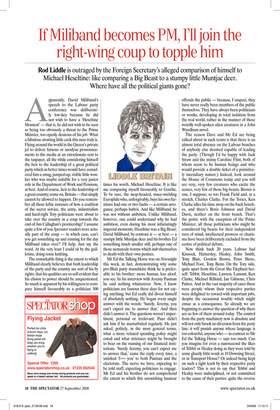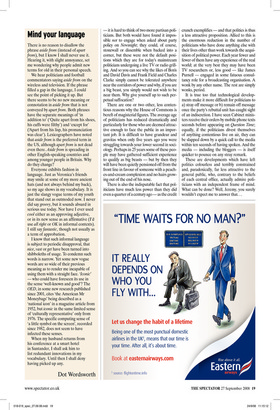If Miliband becomes PM, I’ll join the right-wing coup to topple him
Rod Liddle is outraged by the Foreign Secretary’s alleged comparison of himself to Michael Heseltine: like comparing a Big Beast to a stumpy little Muntjac deer. Where have all the political giants gone?
Apparently, David Miliband’s speech to the Labour party conference was deliberately low-key because he did not wish to have a ‘Heseltine Moment’ — that is, he did not wish to be seen as being too obviously a threat to the Prime Minister, too openly desirous of his job. What a fabulous strutting little cock this man truly is. Flying around the world in the Queen’s private jet to deliver fatuous or anodyne pronouncements to the media at an extortionate cost to the taxpayer, all the while considering himself the heir to the leadership of a great political party which in better times would have considered him a smug, jumped-up, risible little wonker who was maybe suitable for a very junior role in the Department of Work and Pensions, at best. And of course, heir to the leadership of a great country; come on, Britain — that simply cannot be allowed to happen. Do you remember all those leftie rumours of how a coalition of the secret service, the army, industrialists and hard-right Tory politicians were about to take over the country in a coup towards the end of Jim Callaghan’s premiership? I assume quite a few of you Spectator readers were actually part of the coup — in which case, can’t you get something up and running for the day Miliband takes over? I’ll help. Just say the word. At the very least I could sit by the guillotine, doing some knitting.
The remarkable thing is the extent to which Miliband clearly believes that both leadership of the party and the country are sort of his by rights, that his qualities are so self-evident that his elision to power should be unquestioned. So much is apparent by his willingness to compare himself favourably to a politician 500 times his worth, Michael Heseltine. It is like me comparing myself favourably to Goethe. To be sure, the mop-headed, mace-wielding Europhile who, unforgivably, buys his own furniture had one or two faults — a certain arrogance, perhaps hubris. And like Miliband, he was not without ambition. Unlike Miliband, however, one could understand why he had ambition, even during his most infuriatingly imperial moments. Heseltine was a Big Beast; David Miliband, by contrast is — at best — a stumpy little Muntjac deer and his brother Ed something much smaller still, perhaps one of those nematode worms which stab themselves to death with their own penises.
Mr Ed the Talking Horse was on Newsnight this week, in fact, demonstrating why some pro-Blair party munchkins think he is preferable to his brother: more human, less aloof, you see. In his interview with Jeremy Paxman he said nothing whatsoever. Now, I know politicians are famous these days for not saying anything; but Ed really did divest himself of absolutely nothing. He began every single answer with the words: ‘Surely, Jeremy, you can’t expect me to answer that.’ And then didn’t answer it. The questions weren’t impertinent, personal or irrelevant; Paxo didn’t ask him if he masturbated regularly. He just asked, politely, in the most general terms, what a more relaxed spending policy might entail and what strictures might be brought to bear on the running of our financial institutions. ‘Surely Jeremy, you can’t expect me to answer that,’ came the reply every time, a smirked ‘f*** you’ to both Paxman and the electorate. The nerve we have, expecting to be told stuff, expecting politicians to engage. Mr Ed and his brother do not comprehend the extent to which this astonishing hauteur offends the public — because, I suspect, they have never really been members of the public themselves. They have always been politicians or wonks, developing in total isolation from the real world, rather in the manner of those weirdly well-spoken alien creatures in a John Wyndham novel.
The reason Dave and Mr Ed are being talked about in such terms is that there is an almost total absence on the Labour benches of anybody else deemed capable of leading the party. (Though I’d be happy with Jack Straw and the minxy Caroline Flint, both of whom seem to be human beings and who would provide a double ticket of a primitively incendiary nature.) Indeed, look around the House of Commons today and you will see very, very few creatures who excite the senses, very few of those big beasts. Brown is one, I suppose; so too Frank Field and, at a stretch, Charles Clarke. For the Tories, Ken Clarke idles his time away on the back benches, and there’s Boris Johnson and David Davis, neither on the front bench. That’s the point; with the exception of the Prime Minister, all those politicians who might be considered big beasts for their independent turn of mind, intellectual prowess or charisma have been deliberately excluded from the centre of political debate.
Now think back 20 years. Labour had Kinnock, Hattersley, Healey, John Smith, Tony Blair, Gordon Brown, Peter Shore, Michael Foot, Tony Benn. On the Tory side, quite apart from the Great She Elephant herself: Tebbit, Heseltine, Lawson, Lamont, Ken Clarke, Michael Rifkind, Ian Gilmour, Chris Patten. And in the vast majority of cases these were people whom their respective parties were delighted to reward with important jobs, despite the occasional trouble which might ensue as a consequence. So already we are beginning to answer the question of why there are so few of them around today. The control from the party machinery now is absolute and will not only brook no diversion from the party line: it will punish anyone whose language is too colourful, anyone who — in contrast to Mr Ed the Talking Horse — says too much. Can you imagine for even a nanosecond the likes of Tebbit or Healey doing as they were told by some ghastly little wonk in 10 Downing Street, or in Transport House? Or indeed being kept on such a tight leash by their respective party leaders? This is not to say that Tebbit and Healey were indisciplined, or not committed to the cause of their parties: quite the reverse — it is hard to think of two more partisan politicians. But both would have found it impossible not to engage when asked about party policy on Newsnight; they could, of course, stonewall or dissemble when backed into a corner, but these were not the default positions which they are for today’s mainstream politicians undergoing a live TV or radio grilling. And so you can see why the likes of Boris and David Davis and Frank Field and Charles Clarke simply cannot be tolerated anywhere near the corridors of power and why, if you are a big beast, you simply would not wish to be near them. Why give yourself up to such perpetual suffocation?
There are one or two other, less contentious reasons why the House of Commons is bereft of magisterial figures. The average age of politicians has reduced dramatically and particularly for those who are deemed attractive enough to face the public in an important job. It is difficult to have grandeur and gravitas when only five years ago you were struggling towards your lower second in sociology. Perhaps in 25 years some of these people may have gathered sufficient experience to qualify as big beasts — but by then they will have been quietly pensioned off from the front line in favour of someone with a peaches-and-cream complexion and no hairs growing out of the end of his nose.
There is also the indisputable fact that politicians have much less power than they did even a quarter of a century ago — as the credit crunch exemplifies — and that politics is thus a less attractive proposition. Allied to this is the enormous reduction in the number of politicians who have done anything else with their lives other than work towards the acquisition of political power. Each year fewer and fewer of them have any experience of the real world; at the very best they may have been TV researchers or, less good — like James Purnell — engaged in some fatuous consultancy role for a broadcasting organisation. A wonk by any other name. The rest are simply wonks, period.
It is true too that technological developments make it more difficult for politicians to a) stray off message or b) remain off message once the party’s rebuttal unit has caught sight of an indiscretion. I have seen Cabinet ministers receive their orders by mobile phone texts seconds before appearing on Question Time; equally, if the politicians divest themselves of anything contentious live on air, they can be slapped down by a quick call to the media within ten seconds of having spoken. And the media — including the bloggers — is itself quicker to pounce on any stray remark.
These are developments which have left politics colourless and terribly constrained and, paradoxically, far less attractive to the general public, who, contrary to the beliefs of each central office, actually admire politicians with an independent frame of mind. What can be done? Well, Jeremy, you surely wouldn’t expect me to answer that...











































































 Previous page
Previous page